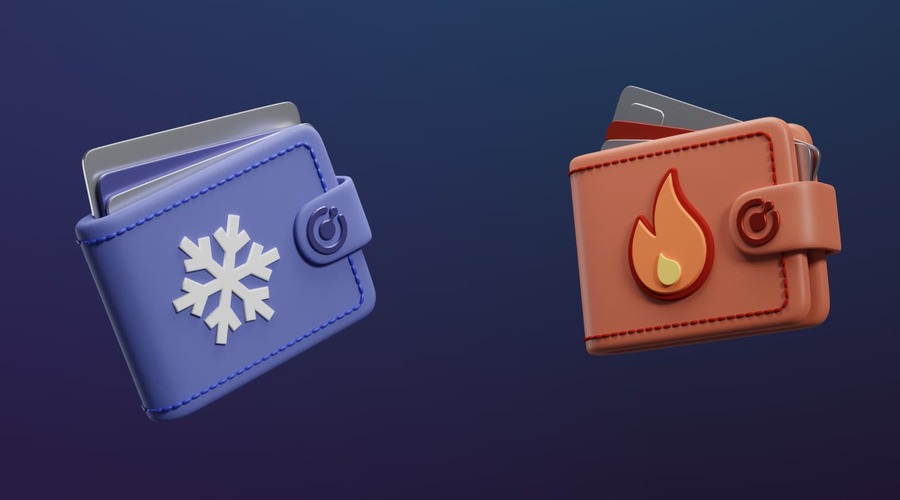

Are you planning to invest in cryptocurrencies? Then, you must be aware of the importance of wallets in managing your digital assets. There are two types of wallets available in the market, hot wallets and cold wallets. In this article, we will explore the differences between hot and cold wallets and help you choose the one that suits your needs.
Introduction
Cryptocurrencies are digital assets that are secured using cryptography. They are decentralized and operate independently of any central authority. As a result, managing cryptocurrencies requires a secure and reliable way to store and access your digital assets. This is where wallets come into play. A wallet is a software or hardware device that allows you to securely store and manage your cryptocurrencies.
There are two types of wallets available in the market, hot wallets, and cold wallets. Hot wallets are online wallets that are connected to the internet, whereas cold wallets are offline wallets that are not connected to the internet. In this article, we will explore the differences between hot and cold wallets and help you choose the one that suits your needs.
What are hot wallets?
Hot wallets are online wallets that are connected to the internet. They are accessible through a website or a mobile app, and they store your private keys on their servers. Private keys are a crucial component of your cryptocurrency ownership, and they allow you to access your digital assets.
Types of hot wallets
There are several types of hot wallets available in the market, including:
- Exchange wallets: These wallets are provided by cryptocurrency exchanges and are used to store your cryptocurrencies on the exchange. They are convenient to use but are not very secure.
- Mobile wallets: These wallets are mobile apps that allow you to manage your cryptocurrencies on the go. They are easy to use and provide quick access to your digital assets.
- Desktop wallets: These wallets are software programs that are installed on your computer. They are secure but are only accessible through your computer.
Advantages of hot wallets
- Convenient to use and access your digital assets quickly
- Available on various devices, including smartphones, laptops, and desktops
- Provide an easy-to-use interface for managing your cryptocurrencies
Disadvantages of hot wallets
- Prone to hacking and cyber attacks
- Not very secure as they store your private keys on their servers
- May have limited functionality compared to cold wallets
What are cold wallets?
Cold wallets are offline wallets that are not connected to the internet. They are physical devices that store your private keys offline, making them less susceptible to cyber attacks and hacking.
Types of cold wallets
There are two types of cold wallets available in the market:
- Hardware wallets: These wallets are physical devices that store your private keys offline. They are the most secure way to store your digital assets and offer robust security features.
- Paper wallets: These wallets are pieces of paper that contain your private keys. They are the most basic form of cold storage and are not very convenient to use.
Advantages of cold wallets
- Highly secure and less susceptible to hacking and cyber attacks
- Provide full control over your private keys
Disadvantages of cold wallets
- Not very convenient to use, especially paper wallets
- May require some technical expertise to set up and use hardware wallets
- Can be lost or damaged, leading to the loss of your digital assets if not backed up properly
Factors to consider before choosing a wallet
Choosing the right wallet for your needs depends on several factors, including:
Security
The most important factor to consider when choosing a wallet is security. You want to ensure that your digital assets are safe and secure. Cold wallets are generally more secure than hot wallets since they are not connected to the internet. However, hardware wallets offer the most robust security features and are the most secure way to store your cryptocurrencies.
Convenience
Convenience is another factor to consider when choosing a wallet. Hot wallets are generally more convenient to use since they can be accessed from anywhere with an internet connection. Cold wallets, on the other hand, require you to have physical access to the device, which may not always be convenient.
Cost
The cost of a wallet is also a factor to consider. Hot wallets are generally free to use, while cold wallets can be more expensive. Hardware wallets, in particular, can be quite costly but offer the best security features.
User experience
The user experience of a wallet is also important. You want a wallet that is easy to use and navigate. Hot wallets generally offer a more user-friendly experience, while cold wallets may require some technical expertise to set up and use.
Conclusion
Choosing the right wallet for your needs depends on several factors, including security, convenience, cost, and user experience. Hot wallets are more convenient to use, but less secure, while cold wallets are more secure but less convenient. Hardware wallets offer the best security features but can be costly. Ultimately, it comes down to your personal preferences and priorities.


I have been featured in numerous publications, both online and offline, and am a regular speaker at industry events. I am also the founder of Crypto University, an online educational platform that helps people learn about cryptocurrencies and blockchain technology. In addition to my writing and teaching career, I am also an active investor in the cryptocurrency space. I have made investments in some of the leading projects in the space, and my portfolio has outperformed the market by a wide margin.
